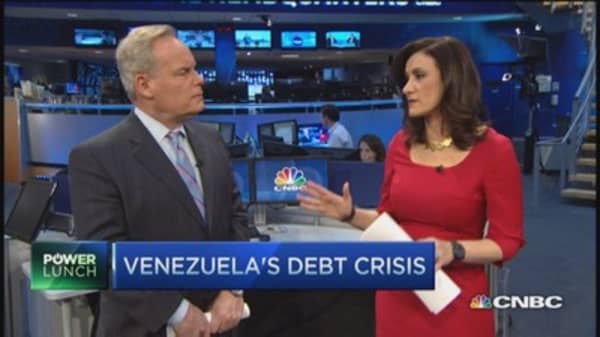Under the terms of the Petrocaribe agreement, the drop in oil prices has—paradoxically—raised members' oil import costs. That's because, as crude prices fall, they lose access to extremely generous financing terms that amount to subsidies.
When oil was over $100 a barrel, Petrocaribe member countries paid just 40 percent of the upfront costs, and Venezuela's state oil company, PDVSA, covered the rest of the expense with a low interest rate loan payable over 25 years. Some have also paid their oil bills with bartered agricultural products or services.
The extra cash from deferred payments helped some countries finance infrastructure projects and other spending programs.
But those finance terms become much less generous as the price of oil falls, forcing member countries to pay more upfront, with payment in full when prices fall below $40 a barrel, according to RBC economist Marla Dukharan.
Read MoreThe countries slammed worst by plunging oil prices
Cheap oil has also discouraged Petrocaribe countries from diversifying their energy reliance away from oil to more efficient sources like natural gas or renewables like solar, which is in abundant supply in the Caribbean.
"Most Petrocaribe members depend on outdated fuel oil generators to provide the majority of their electricity, a practice that nonsubsidized states have long since dropped," according to a research report by Scotiabank analyst Rory Johnston
The Venezuela oil deals have also left some Petrocaribe countries with sizable debts that Venezuela's cash-strapped government can ill afford to refinance.
Some Caribbean countries are at much greater risk than others, according to Johnston. Haiti, for example, imported nearly all of its all oil through Petrocaribe in 2013, and had accumulated the highest deferred payments among the group. Suriname and the Dominican Republic have a more diverse source of oil imports and will not be hit as hard by the loss of cheap Venezuelan oil.
With the future of Venezuelan oil sales in doubt, the White House last month invited Petrocaribe countries to Washington for a Caribbean Energy Security Summit, hosted by Vice President Joe Biden.
The closed talks also included other U.S. officials and representatives from the European Union, the United Nations and financing agencies including the World Bank and Inter-American Development Bank. At the summit's conclusion, the U.S. joined a consortium providing $63 million in financing for a wind farm in Jamaica.
The meeting did not go unnoticed in Caracas, where Venezuelan President Nicolas Maduro has been struggling to keep his country's economy afloat as oil prices have plunged and revenues have dried up.
Over the weekend, Maduro claimed in a televised address that Biden had tried to foment the overthrow of his socialist government during the Caribbean energy summit. Maduro claimed that Biden told the Caribbean leaders that the Venezuelan government's days were numbered and it was time they abandon their support, a claim Biden's office dismissed.
"President Maduro's accusations are patently false and are clearly part of an effort to distract from the concerning situation in Venezuela, which includes repeated violations of freedom of speech, assembly and due process," Biden's office said in a statement.





